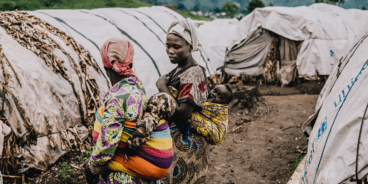
Atrocity Alert No. 112: South Sudan and Children and Armed Conflict
Atrocity Alert is a weekly publication by the Global Centre for the Responsibility to Protect highlighting situations where populations are at risk of, or are enduring, mass atrocity crimes.
South Sudan’s latest failed peace agreement
In yet another attempt to end almost five years of civil war in South Sudan, President Salva Kiir and “Sudan People’s Liberation Army in Opposition” leader Riek Machar signed a new peace deal on Wednesday, 27 June. The principle purpose of the “Khartoum Declaration” was the establishment of a permanent ceasefire between the warring parties. However, just hours after entering into effect on 30 June the latest ceasefire was violated with both government forces and rebel groups accusing the other of attacking their positions.
The government reported coordinated rebel attacks in four different states across South Sudan on 30 June. According to rebel spokesperson Colonel Lam Paul Gabriel, the government launched an attack on their forces within Mboro village in Wau State on 30 June. Separate clashes the following day reportedly killed 18 civilians in Upper Nile State. Political recriminations and sporadic fighting have reportedly continued since then.
Since December 2013 an estimated 4.5 million South Sudanese have been forced to flee their homes due to conflict, with 2.6 million refugees spread across neighboring countries. In May 2018 alone, tens of thousands of people were displaced as a result of fighting in several parts of Unity State. According to the UN Office for the Coordination of Humanitarian Affairs, 7.1 million people are currently severely food insecure and South Sudan officially remains on the brink of famine.
Following the violation of the ceasefire on 30 June, African Union (AU) Commission Chairperson Moussa Faki Mahamat called for measures to be taken against the key actors in South Sudan, including possible sanctions, due to their failure to honor the Khartoum Declaration. One month earlier, on 31 May, the UN Security Council (UNSC) adopted a resolution expressing its intention to consider targeted sanctions against six senior officials and/or an arms embargo, if fighting were to continue and parties failed to reach a viable peace agreement. The Council will discuss the situation in South Sudan this Thursday, 5 July.
After five years of armed conflict, atrocities, broken promises and untold misery inflicted upon the people of South Sudan, the international community must do more to uphold its collective responsibility to protect. The UNSC should immediately impose targeted sanctions as well as an arms embargo on South Sudan. The AU should also adopt sanctions against those implicated in violating the recent ceasefire agreement and obstructing or profiting from ongoing armed conflict. All perpetrators of atrocities in South Sudan – regardless of position or affiliation – must be held accountable.
Children and Armed Conflict
On Wednesday, 27 June, the UN Secretary-General’s annual report on children and armed conflict was released. The report documents the killing and maiming of over 10,000 children during 2017, and the recruitment of over 9,500 child soldiers, marking a 26 percent increase from 2016. Many of the grave violations outlined within the report – including the killing, maiming and rape of children, the recruitment of child soldiers, and the targeting of civilian infrastructure – constitute war crimes and/or crimes against humanity.
In Syria, children suffered the highest number of verified violations ever recorded in the country, with at least 910 killed and 361 injured during 2017. The recruitment and use of child soldiers quadrupled in the Central African Republic last year and doubled in the Democratic Republic of the Congo (DRC). There was also an estimated eightfold increase in attacks on education and health facilities in the DRC, with 396 recorded attacks on schools and 119 attacks on hospitals. In Somalia, Al-Shabaab abducted more than 1,600 children in 2017, many of whom also became victims of sexual violence.
The report also contains a so-called “list of shame” of parties that the UN Secretary-General identifies as having committed grave violations against children in conflict, as well as a list of parties that have committed violations but have taken steps to improve the protection of children. The Saudi Arabia and United Arab Emirates-led military coalition in Yemen has been removed from the list of parties that have attacked schools and hospitals, despite five documented attacks on hospitals. Additionally, the Secretary-General’s lists do not include the Israeli Defense Forces, despite the report documenting the killing of 17 children and the injury of 1,160 children in the Occupied Palestinian Territories.
The Secretary-General’s report on Children and Armed Conflict provides an important tool for identifying and holding accountable perpetrators of atrocities against children. All parties that have been identified as having committed grave violations against children should be included within the annexed “list of shame.”
Related Publications


